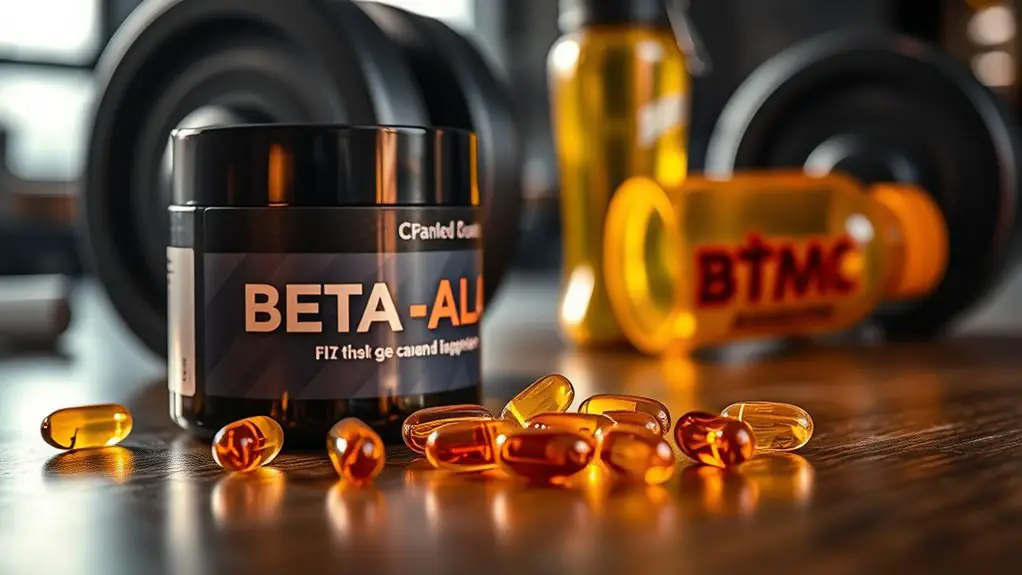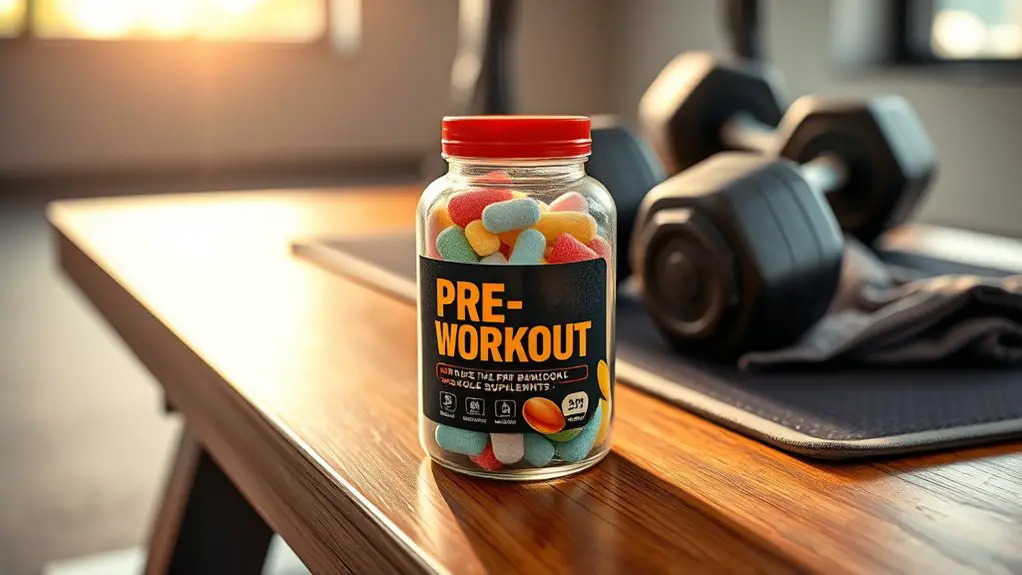The Best Supplements for Muscle Growth

To boost muscle growth, consider protein supplements like whey and casein, which help meet your daily protein needs. Creatine is another key player, enhancing strength and performance. Don’t overlook BCAAs for quicker recovery and beta-alanine to improve your endurance. Omega-3 fatty acids can support overall health and reduce inflammation. Pre-workout supplements can maximize your sessions. If you’re curious about how to use these supplements effectively, there’s more to explore on their benefits and timing.
Understanding the Basics of Muscle Growth

When you think about building muscle, it’s essential to grasp the fundamentals of how muscle growth actually works. Muscle hypertrophy factors play a significant role in this process. When you engage in resistance training, your muscle fibers sustain tiny injuries, prompting your body to repair and grow stronger. However, it’s not just about lifting weights; recovery importance can’t be overstated. Without adequate rest, your muscles can’t recover effectively, which stalls growth.
Make sure to prioritize sleep and allow your body time to heal. This means incorporating rest days into your routine and listening to your body’s signals. Nutrition also plays a critical role, providing the necessary building blocks for recovery. Hydration is key, too, as it supports overall bodily functions during this process. Balancing training, recovery, and nutrition will set you on the right path toward achieving your muscle-building goals safely and effectively.
Protein Supplements: The Foundation of Muscle Building
When it comes to building muscle, protein supplements play an essential role in your diet. You’ll want to explore the different types available, understand how much you should be consuming, and know the best times to take them for ideal results. Let’s break down these key points to help you maximize your muscle growth.
Types of Protein Supplements
Protein supplements serve as an essential component in your muscle-building journey, especially if you’re aiming to meet your daily protein requirements. With various options available, it’s vital to choose the right type for your needs. Here are three popular types of protein supplements you might consider:
- Whey Protein: Quickly absorbed, it’s perfect for post-workout recovery.
- Casein Protein: A slower-digesting option, ideal for nighttime use to support muscle repair.
- Plant-Based Protein: Suitable for vegans and those with lactose intolerance, it can come from sources like peas or hemp.
You can also explore options like egg protein, collagen peptides, protein bars, and protein powders or shakes to diversify your intake and enhance your muscle growth safely.
Optimal Protein Intake
To effectively build muscle, it is vital to understand your ideal protein intake. Ideal protein sources, like whey, casein, and plant-based proteins, play a significant role in muscle synthesis. Aim for about 1.6 to 2.2 grams of protein per kilogram of body weight daily, depending on your training intensity.
Here’s a simple breakdown of protein sources:
| Source | Protein Content (per serving) | Benefits |
|---|---|---|
| Whey Protein | 20-25g | Fast absorption |
| Casein Protein | 20-25g | Slow digestion |
| Plant Protein | 15-20g | Nutrient-rich |
Incorporating protein timing strategies, such as regular intake post-workout, can further enhance muscle growth while keeping your body safe and healthy.
Timing for Consumption
Understanding the timing of your protein supplement consumption can greatly impact your muscle-building efforts. Proper meal timing guarantees your body has the nutrients it needs when it needs them most, especially post workout. Here are three key times to take into account:
- Pre-Workout: Consuming protein before your workout can help fuel your muscles and enhance performance.
- Post Workout: This is the most critical time to consume protein, as your muscles are primed for recovery and growth. Aim for a protein shake within 30 minutes after exercising.
- Between Meals: Incorporating protein supplements between meals can help maintain a steady supply of amino acids, supporting muscle repair and growth throughout the day.
Creatine: Boosting Strength and Performance
When it comes to enhancing your strength and performance, creatine is a standout supplement you should consider. Understanding its mechanism of action, the different types available, and ideal dosage guidelines can help maximize its benefits. Let’s explore how creatine can support your fitness goals effectively.
Mechanism of Action
Creatine plays an essential role in boosting strength and performance by enhancing the availability of adenosine triphosphate (ATP), the primary energy carrier in your muscles. Its mechanism of action involves several key processes:
- Increased ATP Production: Creatine helps regenerate ATP quickly during high-intensity exercise, providing you with the energy needed for peak performance.
- Hormonal Regulation: It may positively influence hormonal responses, promoting muscle growth and recovery after workouts.
- Cellular Signaling: Creatine affects cellular signaling pathways, which can enhance muscle protein synthesis and adaptation to training.
Types of Creatine
While there are various forms of creatine available on the market, each type offers unique benefits that can enhance your strength and performance. The most common creatine sources include creatine monohydrate, known for its effectiveness and affordability, and creatine ethyl ester, which may improve absorption. Another option is buffered creatine, designed to reduce stomach discomfort.
Each type provides creatine benefits, such as increased energy during workouts, improved recovery times, and enhanced muscle mass. It is crucial to choose a form that aligns with your needs and preferences. Always prioritize safety by opting for reputable brands and consulting with a healthcare professional if you have concerns. This way, you can safely harness the power of creatine for your fitness goals.
Optimal Dosage Guidelines
Choosing the right type of creatine is just the first step; understanding how much to take can greatly impact your results. To guarantee supplement safety while optimizing your muscle growth, consider these dosage guidelines for personalized nutrition:
- Loading Phase: If you choose to load, take about 20 grams daily for 5-7 days, divided into 4 servings.
- Maintenance Dose: After the loading phase, switch to a maintenance dose of 3-5 grams daily.
- Hydration: Always stay well-hydrated, as creatine can draw water into your muscles.
Branched-Chain Amino Acids (BCAAs): Enhancing Recovery
When you push your body to its limits during workouts, recovery becomes essential for muscle growth, and that’s where Branched-Chain Amino Acids (BCAAs) come into play. These essential amino acids—leucine, isoleucine, and valine—offer several BCAA benefits that can enhance your recovery strategies. They help reduce muscle soreness, decrease exercise fatigue, and stimulate protein synthesis, making them a great addition to your post-workout routine.
Taking BCAAs can support your body in repairing muscle tissue and speeding up recovery times, allowing you to get back to your training with less downtime. Incorporating them into your diet can be simple, whether through supplements or protein-rich foods. Just remember to choose high-quality products and consult with a healthcare professional if you’re unsure about the right dosage. By prioritizing your recovery with BCAAs, you’ll be better equipped to achieve your muscle growth goals safely and effectively.
Beta-Alanine: Improving Endurance and Reducing Fatigue

If you’re looking to enhance your workout performance, beta-alanine might be your secret weapon. This powerful supplement’s been shown to improve endurance and reduce fatigue, making it easier for you to push through tough workouts. Here are some key beta-alanine benefits you should know:
- Increased Muscle Carnosine Levels: Beta-alanine helps boost carnosine in your muscles, which can buffer acid buildup during intense exercise, prolonging your stamina.
- Improved Exercise Capacity: Studies show that taking beta-alanine can enhance your overall exercise capacity, allowing you to train harder and longer.
- Reduced Perceived Fatigue: By mitigating feelings of fatigue, beta-alanine can help you maintain focus and intensity during your workouts.
Always consult a healthcare professional before starting any supplement regimen. With the right approach, beta-alanine can be a game-changer for your endurance enhancement goals!
Omega-3 Fatty Acids: Supporting Overall Health and Recovery
After optimizing your endurance with beta-alanine, it’s time to focus on recovery and overall health. Omega-3 fatty acids are vital for supporting muscle recovery and reducing inflammation, making them a valuable addition to your supplement regimen. Among the many omega 3 benefits, you’ll find improved joint health, enhanced cardiovascular function, and boosted immune response, all significant for maintaining your workout routine.
To reap these benefits safely, consider dosage recommendations of 1,000 to 3,000 mg of combined EPA and DHA per day. This range helps guarantee you’re getting enough without overdoing it. If you’re pregnant, nursing, or have any health concerns, it’s best to consult with a healthcare professional before starting omega-3 supplements. By incorporating omega-3s into your diet, you’ll not only aid your recovery but also support your overall well-being, helping you stay on track with your fitness goals.
Pre-Workout Supplements: Maximizing Your Workout Potential

To maximize your workout potential, incorporating pre-workout supplements can give you that extra edge you need. These supplements are designed to enhance performance and focus, ensuring you get the most out of every session. When choosing pre-workout options, look for safe and effective pre workout ingredients that can help boost your energy levels.
Incorporating pre-workout supplements can enhance your performance and focus, maximizing every workout session.
Here are three key components to examine:
- Caffeine: A well-known energy booster that can improve endurance and focus.
- Beta-Alanine: Helps buffer acid in muscles, reducing fatigue during intense workouts.
- Creatine: Supports strength and power, enhancing overall muscle growth.
Always consult with a healthcare professional before starting any new supplement routine, ensuring it aligns with your health goals. Prioritizing safety is essential, so choose products from reputable brands to support your fitness journey effectively.
Frequently Asked Questions
Are Natural Supplements Better Than Synthetic Ones for Muscle Growth?
When considering natural vs synthetic supplements for muscle growth, it often comes down to your personal preferences and safety concerns. Natural supplements tend to have fewer side effects and are generally perceived as safer. However, synthetic options can offer more concentrated results. Regarding effectiveness comparison, some might find synthetic supplements provide quicker gains, but it’s essential to weigh those benefits against potential risks. Ultimately, your choices should prioritize safety and overall health.
Can Supplements Replace a Balanced Diet for Muscle Building?
Supplements can’t truly replace a balanced diet for muscle building. While they can help meet dietary requirements, they should complement, not substitute, whole foods. Different supplement types, like protein powders or creatine, may support your goals, but they lack the full spectrum of nutrients found in real food. Relying solely on supplements might lead to deficiencies, so it’s essential to prioritize a nutritious diet alongside any supplementation for safe and effective muscle growth.
How Long Does It Take to See Results From Supplements?
So, you think you’ll pop a pill and wake up ripped tomorrow? If only! Seeing results from supplements varies, depending on individual factors like your diet, workout routine, and genetics. Generally, you might notice changes in a few weeks, but don’t forget about supplement timing—taking them at the right moments can help. Just remember, supplements aren’t magic; they work best alongside a balanced diet and exercise. Safety first, always!
Are There Any Side Effects Associated With Muscle Growth Supplements?
When considering muscle growth supplements, it’s essential to be aware of potential side effects. A side effects overview can reveal issues like digestive discomfort, headaches, or even more serious concerns depending on the ingredients. Always prioritize supplement safety by researching products and consulting with a healthcare professional. Remember, not all supplements are created equal, and understanding your body’s response can help you avoid adverse effects while pursuing your fitness goals.
Can I Take Multiple Supplements Simultaneously for Better Results?
Yes, you can take multiple supplements simultaneously for better results, but you need to be cautious. Consider supplement combinations that complement each other, like protein with creatine. Timing strategies are essential too; taking certain supplements pre- or post-workout can enhance their effectiveness. Always consult with a healthcare professional to guarantee safety, as mixing supplements can lead to unwanted side effects or interactions. Your health should always come first in your fitness journey.





